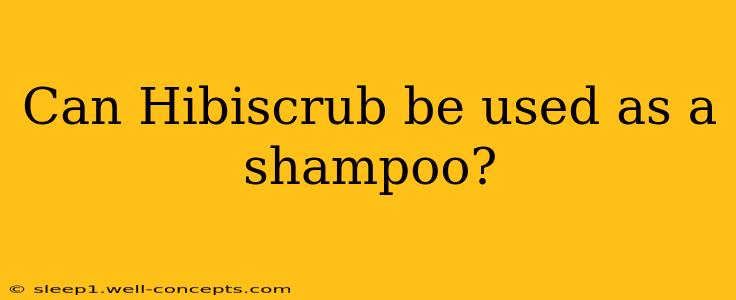Hibiscrub, a popular antiseptic wash containing chlorhexidine gluconate, is a staple in many households for its powerful germ-killing properties. But the question arises: can this potent solution be used as a shampoo? The short answer is no, and this article will delve into the reasons why, exploring the potential risks and offering safer alternatives for scalp care.
Why Hibiscrub Shouldn't Be Used as Shampoo
While Hibiscrub effectively cleanses and disinfects the skin, its use on the scalp as a regular shampoo is strongly discouraged. Here's why:
1. Potential for Scalp Irritation and Damage:
Chlorhexidine gluconate, the active ingredient in Hibiscrub, is a powerful antiseptic. While effective against bacteria and fungi, it can also be harsh and drying on the scalp. Frequent use can lead to:
- Scalp irritation: Redness, itching, and inflammation are common side effects.
- Dryness and flaking: Hibiscrub can strip the scalp of its natural oils, leading to dryness, flaking, and even dandruff.
- Allergic reactions: Some individuals may experience allergic contact dermatitis, characterized by severe itching, rash, and blistering.
2. Disruption of the Scalp's Natural Microbiome:
The scalp, like other parts of the body, has a delicate ecosystem of microorganisms. Hibiscrub's potent antiseptic action can disrupt this microbiome, potentially leading to imbalances that could worsen existing scalp conditions or create new ones. This disruption can contribute to further irritation and inflammation.
3. Long-Term Effects Unknown:
While short-term use might not present significant issues for some, the long-term effects of regularly using Hibiscrub on the scalp are largely unknown. The potential for cumulative damage and disruption of the scalp's natural functions warrants caution.
4. Ineffective for Most Scalp Conditions:
Hibiscrub's primary use is for surgical and wound disinfection. It is not designed to treat common scalp conditions like dandruff, seborrheic dermatitis, or psoriasis. In fact, using it might worsen these conditions due to its drying and irritating effects.
When Hibiscrub Might Be Considered (Under Medical Supervision)
There are rare exceptions where a doctor might recommend using Hibiscrub on the scalp, such as treating specific infections like folliculitis (inflammation of hair follicles) or severe scalp conditions unresponsive to other treatments. However, this should always be under the strict guidance and supervision of a dermatologist or healthcare professional. They can assess the specific situation, determine the appropriate concentration and frequency of use, and monitor for any adverse reactions.
Safer Alternatives for Scalp Care
For everyday scalp cleansing and maintenance, choose a gentle, pH-balanced shampoo specifically formulated for your hair type and scalp condition. If you have concerns about scalp health, consult a dermatologist or trichologist. They can diagnose any underlying issues and recommend appropriate treatments.
Conclusion
While Hibiscrub's antiseptic properties are valuable in specific medical contexts, it is not a suitable substitute for regular shampoo. Its harsh nature can lead to scalp irritation, dryness, and disruption of the scalp's natural microbiome. Always prioritize gentle, appropriate scalp care products and consult a healthcare professional for any concerns regarding scalp health or infections. Never self-treat, and always follow professional medical advice.

